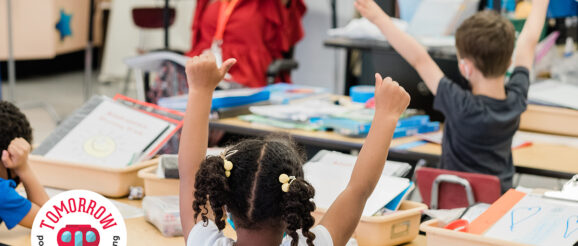Remake Learning’s Moonshot Grants aim to vault learning innovation into the stratosphere | Remake Learning

Something started yesterday. There’s no telling exactly where it will lead.
But the team at Remake Learning and the seven ambitious organizations they’ve pledged to fund are shooting for the moon.
Nearly $500,000 has been awarded to seven educational organizations and schools in the first phase of the 2021 Moonshot Grants, announced yesterday. The recipients, awarded $70,000 each, include Bible Center Church’s Oasis Farm & Fishery, California Area School District, Cornell School District, Duquesne University’s Mak(er)ing Math FABulous, Hatch Art Studio, West Virginia University’s Science Adventure School and Wilkinsburg Public Library.
As with last year’s Tomorrow Grants, which awarded nearly $1.43 million for innovative learning projects, applicants for the Moonshot Grants were asked to dream big.
Since 2020 began, “educators have been surviving and trying to thrive, and people have done the best that they can with what they have,” says Dorie Taylor, Moonshot Grants project manager and co-producer of Remake Learning Days Across America.
“Thinking boldly at this time may be asking a lot. It might be scary. It might be exhilarating,” she says. But it’s also deeply necessary in order to make the most of this unique time of potential change in the world of learning.
Applicants were asked to imagine bold, experimental actions that could bring about “a preferred future of learning” in 10 or 20 years’ time. To facilitate this work, potential applicants were invited to attend workshops where they could think collaboratively about the future of learning
At a Moonshot Grant workshop earlier this year, prospective applicants were asked to describe elements of their preferred future of learning. | Click to enlarge.
Between early February and mid-April, Remake Learning hosted hundreds of participants at those meetings, which were run in collaboration with the nonprofit KnowledgeWorks. They received 90 applications for the first round of funding.
Sorting through dozens of creative ideas, the review committee sought projects that involve solid collaboration and prioritize equity and justice. Ideas like Bible Center Church’s Learning Village Model captured that spirit.
This project involves community elders, local chefs and other adults from the community who will mentor and collaborate with Black students. These students will learn about environmental sustainability, farming and healthy eating as they grow food and learn the business principles involved in running a restaurant.
By mapping the resources in the neighborhoods in and around Homewood, the team at Bible Center’s Oasis Project will connect students to those resources and also share a sense of pride in their history, says Bible Center executive pastor Dr. Cynthia Wallace, who serves as executive director of the Oasis Project.
Some students will build skills and find passions that lead them to careers. Along the way, all the participants will gain math and science skills in a real-world setting while building a connection to the outdoors and a deeper understanding of good nutrition.
“They’re understanding that connection between the environment and urban agriculture and, ‘Wow, I can grow things,” Wallace says. “And when I eat things that are good for me, I feel better. I function at a higher level.”
She points out that Homewood is a food desert, with no supermarkets offering fresh food. Another possible impact of this project: Some students may begin advocating for a grocery store in their area as they learn about the right of all people to have access to healthy food.
Whatever a student’s particular goals, Wallace says, “this is about cultivating a hunger and a thirst for being a lifelong learner.”
The other grantees, including West Virginia University’s Mobile Science Adventure School (SAS) project, also align powerfully with the goals of the Moonshot Grants.
“We’ve built a program that success successfully integrates physical sciences, environmental sciences, adventure sports and experiential education,” SAS director Ali Jeney says. “But now we want to make sure that that never becomes generic. And regardless of the areas of the state where we extend into, it needs to be specialized for every student.”
If students are comfortable outdoors, “they’re going to want to go outside and play to explore, to learn,” she says. That “positive relationship starts with some really foundational understanding of their environment.”
A mobile version of SAS can achieve public health goals and science learning goals by customizing experiences for students in various parts of West Virginia—rock climbing for those near the New River Gorge, for example, and watersports experiences for those in Wheeling. Ideally, the developing mobile curriculum can eventually expand throughout the region and even the nation, Jeney says.
The first-round grant recipients will collaborate as a group to continue developing their ideas throughout this summer and fall.
“We feel just so lucky and privileged to be a part of this lineup,” Jeney says. “We are so grateful for the opportunity and we can’t wait to show everyone what we’re going to do.”
Meanwhile, the application period for the second round of funding opens on June 7, with workshops for prospective applicants happening on June 29, July 22 and Aug. 5. (Learn more here.)
Second-round proposals will be due Aug. 22, with the second cohort of recipients announced on Sept. 20. Along with new applicants, Remake Learning welcomes updated proposals from organizations that applied and were not chosen during the first round.
The Moonshot Grant funding was underwritten by the Grable Foundation, the Henry L. Hillman Foundation, the R.K. Mellon Foundation and the Benedum Foundation.
“In talking to the hundreds of people who came to all of our sessions, everyone was very thankful. They said it was an opportunity to kind of up their game,” Taylor says. “For those who are in the space to really be visionary and challenge the status quo, and inevitably make a better learning environment for youth, for caregivers and for community—this was for them. We’re going to think outside of the box with them.”
Learn more about the seven projects funding during round one here.
